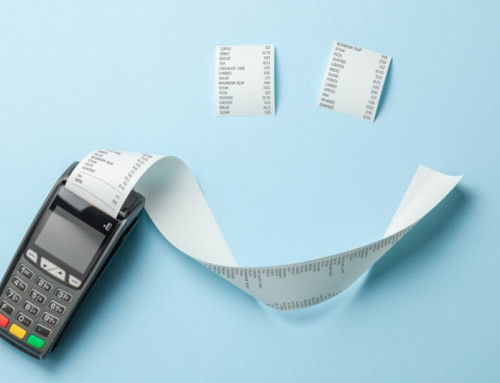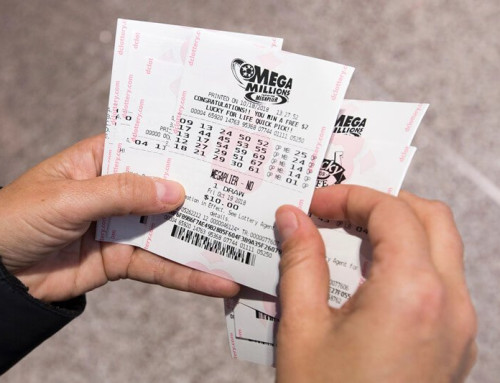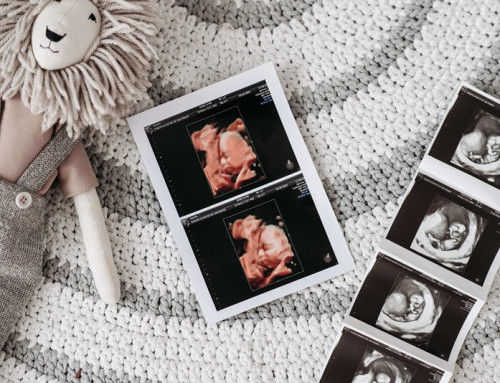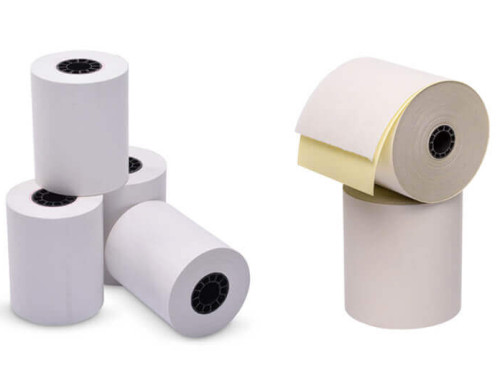Whether you’re a business or individual, keeping receipt paper is vital for some reasons: proof of purchase, warranty claims, contingency for returns and refund, legal compliance, tax documentation, etc. However, the paper can degrade over time, and the printed text on receipt paper may fade.
But why does receipt paper fade? Is it possible to restore faded receipt paper? In this article, we will explore these questions with you.

Faded receipt paper Source: Panda Paper Roll
Why Receipt Paper Fade?

Illustration: How does thermal paper work?
The receipt paper is actually made from thermal paper, which relies on a chemical coating on the paper surface that changes color when exposed to heat. The printing process involves a thermal print head selectively applying heat to the paper, causing the coated areas to darken and form the printed image or text. If you are in the mood to experiment, place a receipt that you don’t need under a hot iron or lighter for about 10 seconds. The heat will change the color of the paper to black.
However, the chemicals used in thermal paper are susceptible to some environmental factors.
Over time, exposure to light, heat, humidity, and other environmental conditions can contribute to the gradual fading of thermal paper. Ultraviolet (UV) light in the sunshine accelerates the degradation process. Additionally, poor storage conditions, such as prolonged exposure to sunlight or high temperatures, can expedite the deterioration of thermal paper.
Now, if you’re wondering why thermal paper is so widespread despite this massive disadvantage, it’s because thermal paper has a low printing cost, and the equipment used to print it requires low maintenance since it doesn’t need ink or ribbon cartridges.
How to Restore Faded Receipts?
Restoring faded thermal receipt paper can be challenging because once the paper has faded, it means that the thermal coating has already undergone a chemical reaction, and reversing this process is usually not possible. However, there are still a few ways you can try.
1. Scan and digitally restore it.
If the paper’s surface is still white (not yellowish, brownish, or blackish), scan the receipt paper to be a colored photo. Open the image in a photo editing software, like Adobe Photoshop, and make a negative of it by adjusting certain image settings – brightness, contrast, and saturation. This might bring out some improvement in the image. You should find these options in the tools provided in the software.
Of course, you can also use mobile apps like LightX, PicsArt, or Tabscanner to adjust the contrast and brightness of the photo of the receipt. This can help make the faded text easier to read.
2. Apply heat to it.
If you’re no Photoshop genius, you can try restoring it the old-fashioned way: by gently applying heat to the thermal paper.
Get your hairdryer and set it on medium, and blow hot air directly towards the receipt until the text becomes visible. You can also heat the receipt using a light bulb if you don’t own a hairdryer.
Regardless of the heat source, never try to apply heat on the front, as this will cause the whole thing to turn black. Keep the source of heat a few inches away from the BACK of the receipt, and make sure to pay close attention to whether the heat is reaching the faded paper or not.
This might darken the paper slightly, but it’s not a guaranteed method and could potentially cause further damage.
3. Use UV light.

UV light Source: Amazon
Using ultraviolet (UV) light to try and restore faded thermal receipts is a method that some people suggest, but it’s important to note that there is no scientific evidence supporting the effectiveness of this approach. The idea is that exposing the faded receipt to UV light might somehow reactivate or enhance the thermal coating. However, this is more of an anecdotal suggestion, and results may vary.
You can acquire a UV light source and find a dark or low-light environment. Place the faded thermal receipt under the UV light source for a few seconds (or several minutes). Be cautious not to expose the receipt to excessive heat, as this could further damage the paper. Then you can observe if the faded receipt paper has any improvement.
Conclusion
For important paper receipts, it’s always advisable to make copies or digitize them (take a photo or scan them) promptly after receiving them to ensure a reliable record. Prevention, such as storing thermal receipts in dry, cool environments and other optimal conditions, is often more effective than attempting to restore faded receipts.
Have you tried restoring old thermal receipt paper with these methods? What other methods do you know? Please share them in the comments. And if you want to get high-quality, long-life thermal paper products, Panda Paper Roll’s thermal paper roll products will always be your first choice.







Didn’t even know that thiswaspossible
You’re OK, guys. The second way of your explanation is the easiest way to recover those faded characters on the receipts. –To Emma– do not put the faded receipt too close to the heat source, especially if it is an open flame source. It may flame up.
Some receipts won’t reappear. So, as a precaution, write important information, like the store name, date, cashier, amount, and the item. The store that issued that receipt will be able to find the original in its database.
A totally random question I’ve lived with for years… I just wanted to iron out my crumpled receipts to scan them and BOOM 💥 Now I have Black nicely ironed faded receipts… Thank you for your solutions… I feel much smarter now… can’t wait for the opportunity to impress someone with this randomly gained knowledge… Much appreciated
Do these recovery methods only work with thermal paper? What about a photo mat with handwritten notes from people using different kinds of pens?
Very easy way to store receipt for a long time as i do, apply highlighter as we do to highlight something on a paper, it will apply a thin coating on the receipt and it never fade.
This is a great idea….thank you for that info……
Thank you for your valuable answer. This is a greate help. (06.01.2022)
Does this really work with a highlighter
What he’s saying isn’t a way of RESTORING the receipts, it’s a way to do so they DON’T fade.
I tried your heat method. From 3″ away, then 2″ away and then with the heat right in front of the receipt and then right in back of the receipt. It did blacken the receipt when I got to close but that made all the faded numbers very easy to see.
My receipt was very wrinkled and I’ve ironed it and it turned black.
It’s a very expensive item receipt that I need for exchanging the item, what can I do?
It seems to be impossible to restore it because you have ironed the receipt.
put ice on receipt
Maria the same thing ! Did you find a way to fix this?
If it was purchased with a credit card they may find it with the card and still be able to return the item.
Are the instructions above the same for “preserving” the receipts?
Emma if you’re just “viewing”, self explanatory!
Mohammed(who commented above) says that highlighting the receipts should preserve the receipts, yet I’m not for certain if it works out not